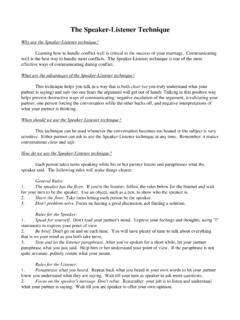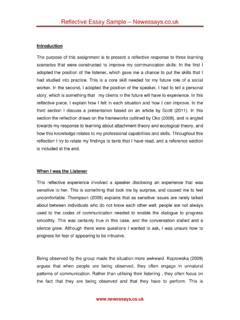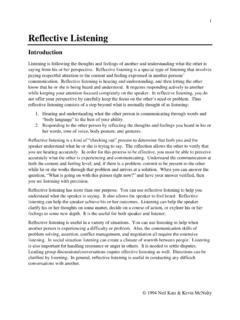Transcription of The development of Oracy skills in school-aged learners
1 The development of Oracy skills in school-aged learners Part of the Cambridge Papers in ELT series November 2018 CONTENTS2 Introduction 3 Part 1: Why is Oracy education important?5 Part 2: The range of Oracy skills7 Part 3: Teaching Oracy skills 14 Part 4: Oracy and bilingual development15 Part 5: Assessing oracy16 Summary and conclusions17 Bibliography19 AppendixIntroduction The term Oracy was coined by Wilkinson in the 1960s to emphasise the educational importance of spoken language skills , on a par with reading and writing skills ; he defined Oracy as the ability to use the oral skills of speaking and listening 1.
2 The concept was championed in the UK by the National Oracy Project in the late 1980s, but fell into disuse when government priorities became focused narrowly on reading, writing and mathematics2. Elsewhere, it was kept alive by the foundation in 1969 of the Oracy Australia Association; but it never caught on in the USA and does not seem to have been translated into other world languages. However, the term is now being used more widely and internationally, reflecting a growing awareness of the educational and social importance of spoken language skills .
3 For example, a 2017 meeting in Lisbon on Oracy in Global Classrooms hosted by the English-Speaking Union was attended by representatives from twenty-two countries3. It remains the most succinct and precise term for referring to the skills involved in using talk to communicate effectively across a range of social contexts. We will use Oracy education to mean the direct, explicit teaching of those skills . 1 Wilkinson, 1965, Norman, 19923 ESU, 201724 Vygotsky, 1962, 19785 Mercer, 20136 Littleton & Mercer, 20137 Goswami & Bryant, 20078 Hart & Risley, 1995 Part 1: Why is Oracy education important?
4 Two key reasons for a focus on Oracy education are its impact on: Children s cognitive development and learning in school; Children s preparation for participation in the wider world. In the early 20th century, the Russian psychologist Vygotsky4 proposed that once a child has acquired language, their thinking is profoundly and irrevocably transformed. As shown in Figure 1, Vygotsky proposed that children s language learning and experience was linked to their cognitive development in a helical continuous process. We now have evidence to substantiate Vygotsky s hypothesis5.
5 Through being involved in spoken dialogues from their earliest years, children learn how both the world, and language, work. They learn how other people make sense of the world, how language is used to reason about causes and effects, how emotions and identities are expressed, and how to work together to solve problems and get things done. Their learning of language is linked to the uses of language they witness as they are immersed in social situations. By listening, attending and contributing to ambient conversation, children take up the language of their social worlds, and are influenced by and influence those around them.
6 Ways of talking shape ways of thinking, and ways of thinking are expressed in ways of talking. Conversely, for the child who is denied a rich language experience, poorly developed Oracy skills mean that the chance to take an active part in learning is seriously diminished. ways of talkingways of thinkingFigure 1. The Vygotskian relationship between language experience and cognitive developmentLanguage shapes our individual thinking and is our prime tool for thinking collectively; we do not just use language to interact, we use it to interthink 6. That is, we share thoughts aloud and so influence others whilst their words influence us, and new shared understanding can be created in the process.
7 But children are not born with language hard-wired into their cognition. They have the capacity to learn language, but they still have to learn it. As with other human tools, they must learn through experience how to use language effectively and they can be directly taught language skills . For the child entering school, much depends on what they have already experienced. It is rarely assumed that children will have picked up the skills of literacy writing and reading are almost always taught; but it remains unusual for Oracy to be taught explicitly.
8 Yet the quality of children s early language experience has been shown to be a powerful predictor of their subsequent educational achievement across the curriculum, not just in those subjects most closely related to language7. Indeed, measures of simply the amount of talk young children are involved in is predictive of their success in effect probably concerns the uses of language for jointly constructing knowledge and understanding, as Vygotsky suggested. As represented 3in the 2016 publication Speaking Frankly9, an increasing number of researchers and educators now argue that schools should offer children that crucial second chance to acquire spoken language skills which they may not have acquired at home; skills which will help them to take up educational opportunities and which could transform their destinies.
9 For that to happen, Oracy must be part of the school curriculum. The educational implications of the case made in Speaking Frankly can be summarised as:1. Governments and school managements need to understand Oracy skills and their importance for the child, the school, and society generally;2. There needs to be a commitment of time and resources in schools for Oracy education;3. Teachers need to be educated in the teaching, monitoring and assessment of spoken language skills ;4. Young people should be taught Oracy skills explicitly and helped to become aware of the importance of using talk effectively for learning and getting things done.
10 Supporters of Oracy education have also argued that it helps to prepare young people with a set of skills for life. Employers commonly report that members of their workforce, especially those engaged in creative activities, management and customer-related roles, need well-developed skills in spoken communication10; but they also regularly claim that school leavers lack those skills11. They want to employ people who can make clear presentations, work well in teams, listen properly to others and solve problems collaboratively. These are also the skills that equip young people for full participation in democratic processes and life in general.









